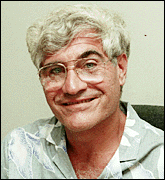

![]()
Gathering Places


![]()
Gathering Places
One of Prime Minister Junichiro Koizumi's greatest challenges will be to help Japan come to terms with its past. It is for this reason that he should honor his pledge to visit the Yasukuni Shrine on Aug. 15, the 56th anniversary of Japan's surrender in World War II. Koizumi’s visit to shrine
presents an opportunity to
deal with Japan’s historySECURITY MATTERS
Koizumi's controversial pledge to visit the shrine -- where are enshrined the spirits of 2.5 million of Japan's war dead -- has caused even some of his closest supporters to challenge his wisdom, since among the enshrined are 14 convicted war criminals.
Debate rages over whether he should go in the face of condemnation in Korea and especially in China, whose principle of "non-interference in internal affairs" evidently does not apply to its dealings with Japan. Further questions have been raised as to whether he should go in his official or private capacity and on Aug. 15 or some other less controversial date.
These are the wrong questions. It is not a matter of if, how and when he should go, but what he should say once there.
While many see the visit as evidence of Japan being unable to deal with its past, the opposite is really the case. Not going to the shrine solves nothing; it merely postpones the reckoning. Koizumi should visit the shrine for the same reason that former President Bill Clinton (himself a Vietnam War protester) had an obligation to visit Washington's Vietnam War Memorial on Veteran's Day: not to glorify war or justify what he saw as an unjust military campaign, but to honor those who sacrificed their lives for their country.
Equally important, visiting the Yasukuni Shrine could be part of a healing process for Japan and its neighbors if handled correctly. Koizumi has said that he wants to make the visit "to express heartfelt sympathy to those who became victims of the nation in spite of themselves."
This is appropriate, but it is not enough. He needs to express his own and his nation's heartfelt apology for the deeds of those "handful of war criminals" whose spirits reside among the "victims."
Japanese prime ministers have expressed profound regret before. In 1995, Prime Minister Tomiichi Murayama used the Aug. 15 date to provide a clear, direct apologies to Japan's neighbors. More recently, Prime Minister Keizo Obuchi put it in writing to South Korea during his 1998/1999 exchange of summits with President Kim Dae-jung of South Korea.
In return, Seoul was to put the past behind it -- a commitment that is unraveling as a result of the proposed visit and an earlier controversy over a middle school history textbook that critics claim glosses over Japan's Imperial past.
Many Koreans and Chinese would prefer that Koizumi not go to the shrine. But not all agree that a visit would necessarily make things worse. As a senior South Korean former official said: "If Koizumi states that the war was wrong and expresses official regrets for what Japan had done to Korea, China, and other Asian neighbors, it will help to lessen the tension...(and) provide a possibility of more constructive dialogue in the future."
A proper apology, especially if it referred to unforgivable actions such as the enslavement of comfort women, could get the reconciliation process back on track. Since more Japanese school- children are likely to hear or read about Koizumi's comments at the Yasukuni Shrine than will ever read the disputed textbook, the right remarks could deflect criticism about Japan trying to glorify its past.
Koizumi has already demonstrated that he has considerable political courage. Rather than continue to skirt this issue, he should go to the shrine on Aug. 15 in his official capacity and use that occasion to deal squarely with the past. Specifically, he should acknowledge and apologize for Japan's unconscionable World War II behavior and its earlier aggression against the Chinese and Korean peoples.
It would then be incumbent on Japan's neighbors to accept his words and acknowledge, finally, that Japan has earned the right to put its Imperial past behind it and, like all other nations, to be judged by its current and future actions and contributions rather than by the actions of a generation now several times removed.
Editor's note: This column was written before Japanese Prime Minister Junichiro Koizumi made his surprise visit to the Yasukuni Shrine today.